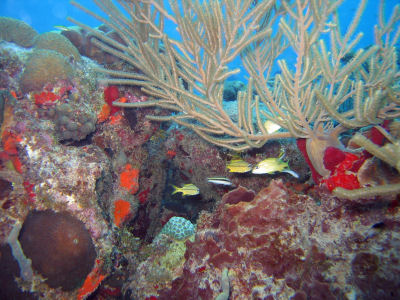Researchers have found three new species that apparently spend their entire lives in the oxygen-starved sediment at the bottom of the Mediterranean Sea.
All Articles
Physicists have developed the smallest electrically pumped laser ever, with a beam that is 30 micrometers long, eight micrometers high, and has a wavelength of 200 micrometers.
“Contrary to expectations and lamentations, widespread piracy does not kill commercial filmmaking,” writes Kevin Kelly. “Existence proof: the largest movie industries on the planet.”
Eating more fruits and vegetables appears to do little to reduce the incidence of cancer — despite decades of exhortations from the World Health Organization that people do so.
Noting Sarah Palin’s meandering phraseology, John McWhorter wonders why mindless speaking no longer prevents someone from becoming a major public influencer.
Robert Wright believes Tiger Woods’ sexual behavior represents a threat to the moral sanction that is vital to the institution of monogamous marriage.
Faced with climate change, some birds are changing their migration schedules and staying closer to home — and in the future they might stop migrating altogether.
A team of Russian and American scientists reported yesterday that they had discovered a new — and very heavy — element, which will be known for now as ununseptium.
Warming world, warming waters, coral reef die-off. You know the drill. But until recently, marine biologists knew relatively little about what exactly was going on, on the bacterial level, when […]
According to Peter Diamandis, founder of the X Prize Foundation, the cost of getting you and your spacesuit into orbit could soon be about $120. That would mean a price […]
WikiLeaks.org has released graphic video of a U.S. military attack in Baghdad on July 12, 2007 in which twelve people were killed, including a Reuters photographer, Namir Noor-Eldeen, and driver, […]
Comcast can decide which of its customers can do what on the Internet. A federal court ruled on Tuesday that the Federal Communications Commission (FCC) doesn’t have the authority to […]
Americans continue to believe in race—“kind of like [how] people believe in witches,” says Princeton historian Nell Irvin Painter. Yet the concept of race as we know it didn’t develop […]
Finally, someone has taken the (necessary) contrarian view: Tiger’s nothing new. Furthermore, his public “shaming” and highly planned apologies are products, like tennis shoes–ones we might consider feeling shame ourselves […]
A study says that the lives of 900 American babies — as well as $13 billion — could be saved each year if their mothers simply continued to breastfeed them through their first six months of life.
An amber deposit found in Ethiopia includes the fossilized remains of Cretaceous era ants, spiders, wasps, and bacteria, and is providing new information about how those species lived.
Research suggests that a gigantic network of offshore wind power stations along the Eastern seaboard could potentially provide energy to a large swath of the U.S. without much threat of outages.
The burgeoning field of animal personality research seeks to figure out why individual members of a species are so unique — and why they remain so through their entire lives.
Glen Whitman writes that economic interventions by policymakers to address anomalies in human behavior “create a serious risk of slippery slopes toward ever more intrusive paternalism.”
About 4.4% of American adults are believed to have attention-deficit hyperactivity disorder, and more and more of them are being diagnosed and treated with medication.
Yassin Musharbash writes that banning women from wearing burqas won’t solve the underlying problems of Muslim immigration and integration that plague Western societies.
A team of researchers are hoping to find 30,000 years of climate records in the rings of preserved kauri trees in the peat bogs of New Zealand.
With tenure-track positions dwindling at universities, Peter Conn writes that humanities faculties need to “articulate our contribution if we hope to find increasing levels of support for the work we do.”
As many as thirty percent of Americans have allergies, and most of the pollen they are affected by comes from trees planted nearby. Cities could relieve sufferers by planting low-pollen street trees.
Bestselling cookbook author and New York Times food columnist Mark Bittman stopped by the Big Think offices a few weeks ago to talk with us about eating, cooking, and the […]
At the New York Review of Books Blog, controversial Catholic theologian Hans Küng blames the celibate priesthood for the epidemic of child rape in the Catholic Church. (The term “rape” […]
David Remnick appeared on Meet the Press yesterdayto discuss his book on Obama. Among other things, he noted how careful the President is in understanding the need for nuance when […]
Today marks the fourth installment of Big Think’s series on business sustainability, sponsored by Logica. For the next nine Mondays (through June 8, 2010), we will release in-depth discussions with top European […]
Ted Leonsis says his 25 years as an entrepreneur and investor have shown him a link between pursuing happiness and achieving financial success in business.
Maia Szalavitz looks at research into the addictive quality of fattening foods, which suggests that long-term exposure to fattening items make users less likely to derive pleasure from them.









